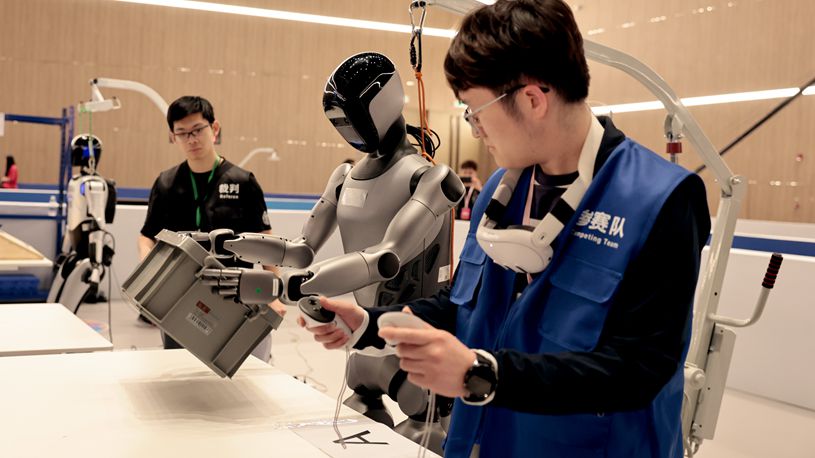AI pets emerge as new form of companionship in China
Source: Xinhua
Editor: huaxia
2025-06-01 10:24:15
by Xinhua writers Yue Yuanyuan, Ma Sijia, Chen Shengwei
BEIJING, June 1 (Xinhua) -- On a typical workday in Beijing, a soft hum rises from 26-year-old Wang Tongtong's desk, not from her phone or computer but from a small grey creature nestled beside her keyboard.
The creature is no ordinary toy -- it's an AI pet. With plush fur, oversized blinking eyes, and synthetic skin that radiates a gentle warmth, it tilts its head toward her, emitting a faint whimper and leaning into her touch like a needy kitten.
"It comforts me when I feel anxious," Wang said. "Real cats and dogs can be messy and moody, but this one just quietly stays by my side."
Though it doesn't move around like a live animal, it can detect people, food, and objects with a built-in camera and respond with eye contact, sound and gesture. Equipped with eight personality modes, the pet evolves based on user interaction.
"Treat it harshly, and it grows grumpy; treat it gently, and it becomes sweet," Wang explained.
This line of AI pets, named ROPET, was developed by Cute World Technologies Ltd., a Beijing-based company where Wang Tongtong is part of the design team. As one of the developers, she has been closely involved in bringing the product to life and was among the first to test it in everyday settings.
According to Zhou Yushu, co-founder of ROPET and a professor at Renmin University of China, the AI pet was designed to "compete" with real animals in terms of touch and feedback. "Most AI pets are designed to serve people," he said. "But we wanted to create something that people see as a real pet."
The appeal of ROPET lies not only in its emotional sensitivity but also in its simplicity. It requires no feeding, walking, or litter cleaning, only occasional charging. All user data is stored locally, ensuring privacy.
Targeted at women aged 25 to 40, the device is gaining traction overseas. Since development began in 2022, ROPET was officially launched on overseas crowdfunding platforms this January, with 1,400 units sold in Europe and North America. An additional 8,000 units have been sold in Japan, the Republic of Korea, and the regions of Hong Kong and Taiwan, with a full launch on the Chinese mainland expected next year.
Another emerging category is AI pets designed for children. At a shopping mall in Nanjing, east China's Jiangsu Province, kids can be seen crowding around several four-legged robotic dogs that can sing, dance, and respond to touch. These are BabyAlpha, AI-powered companion robots developed by Nanjing WEILAN Intelligent Technologies Co., Ltd.
Built on a proprietary multimodal model, BabyAlpha can engage in fluent bilingual conversations, respond to touch with lifelike gestures, take photos, and even patrol rooms.
"Four-legged robots are timeless," said Sun Lixiao, vice president of the company. "We believe embodied AI will become a household interface connecting the digital and physical worlds."
Thanks to China's strong supply chains, BabyAlpha is priced competitively -- on par with a smartphone -- and has seen strong sales across e-commerce platforms.
According to the company, its AI pet users are now spread across all provincial-level regions in China. In the first quarter of this year, sales soared by more than 150 percent year on year, with factory production capacity increasing by 200 percent.
Beyond emotional support, AI pets are increasingly being developed to meet the needs of individuals with special needs. In Shenyang, capital of northeast China's Liaoning Province, a team from Shenyang Ligong University has created an electronic guide dog designed to assist the visually impaired.
Lead developer Yang Wei, a doctoral student at the university, explained that the AI guide dog is built on the Robot Dog Go2 platform developed by Chinese firm Unitree Robotics. It features advanced capabilities such as obstacle avoidance, object recognition, and conversational interaction, and can even assist users in selecting matching clothing colors.
"It's like having a reliable companion," said a trial user at a senior care center. "It helps me travel safely and interact with the world."
According to Jiang Yueqiu, a professor at the university, China has nearly 20 million visually impaired people, with only about 400 trained guide dogs available.
"Electronic guide dogs can help address mobility challenges, provide emotional companionship, and make daily life more accessible for a wider group of visually impaired individuals," she said.
The team plans to trial the device in multiple elderly care institutions and is seeking investment to begin mass production.
In recent years, the growing number of young people living alone has fueled the rise of the "loneliness economy," a market now worth hundreds of billions of yuan.
Against this backdrop, AI pets are emerging as a new option for those who crave companionship but are too busy with work to care for real cats and dogs, allergic to animal fur, or living in pet-restricted housing.
From desktop pets that ease loneliness to robotic dogs that assist the visually impaired, China's AI pet sector is rapidly evolving, promising a future where companionship, care, and cutting-edge technology go hand in paw.
"As an extension of traditional pets, AI companions offer stickiness and sustainability," said Wei Xiang, a professor at the University of Chinese Academy of Social Sciences. "Annual compound growth rate has exceeded 8 percent in recent years, and forecasts indicate it could reach 10 percent over the next five years." ■












Comments